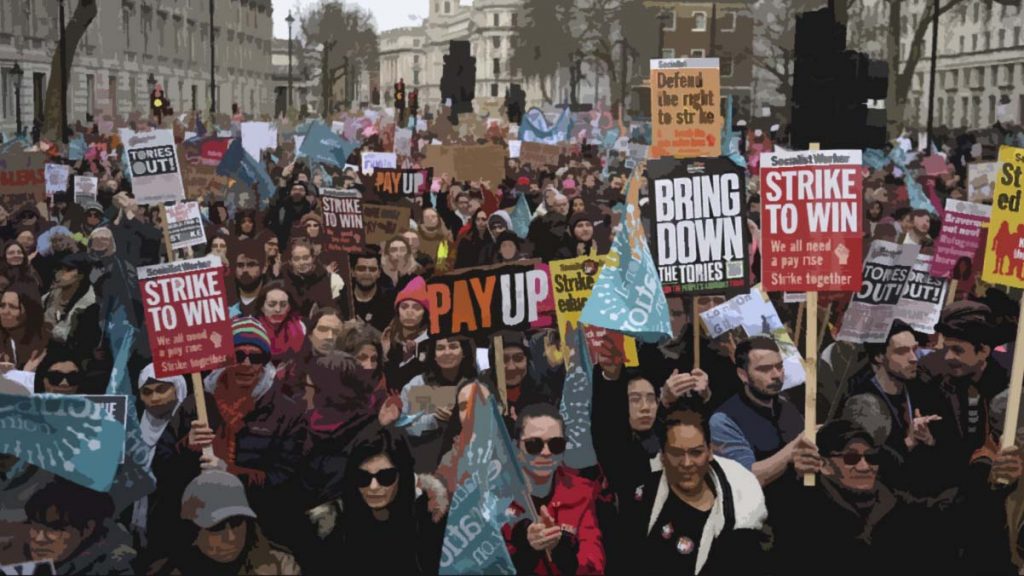The first week of February was marked by the most significant strikes in Britain in recent decades. Teachers, nurses, ambulance drivers, firefighters, public employees, university professors, railway workers, postal workers, and many other sectors are leading an expansive wave of strikes that began several months ago and will continue throughout February and March. February 1 is particularly remarkable for the number of workers who came out into the streets: half a million workers went on strike across England, Wales, and Scotland. Teachers and railway workers met together in massive demonstrations. The “specter” of a general strike haunted the streets as simultaneous strikes of strategic sectors converged across the region. Mick Lynch, Secretary-General of the National Union of Rail, Maritime and Transport Workers (RMT), declared at a rally outside the gates of Downing Street: “We are the working class and we are back!”
This profound process is being driven by drastic increases in the cost of living; the United Kingdom has faced the highest inflation in all of Europe over the last year. On top of this, the consequences of Brexit, the pandemic, and the war in Ukraine have combined to create a major social crisis. Teachers have said that there are days when they are forced to choose between turning on the heat or eating. Added to this is the deterioration of public services, from health to education, over the course of 40 years of neoliberal policies implemented by Conservative and Labour governments alike.
To learn more about the new phenomena being led by the working class in the United Kingdom, we interviewed Satnam Virdee, who researches the British working class, and is Professor of Sociology and Director of the Centre for Research on Racism, Ethnicity and Nationalism (CRREN) at the University of Glasgow (UK). Virdee is author of the book Racism, Class and the Racialized Outcast (Katakrak, 2021).
***
Josefina L. Martinez: What is the historical importance of this new wave of strikes in the United Kingdom?
Satnam Virdee: The current wave of strikes which began in the autumn of 2022 are the most significant phase of collective action in Britain since 1990. More than 450,000 working days were lost due to strike action in November 2022 alone. And on February 1 2023, more than 500,000 workers came out into the streets of all the major cities of Britain to march in protest against the soaring cost of living. What is new about these strikes is that they involve a combination of traditional elements of the working class such as nurses, railway, and postal workers, but also elements of the professional class such as university lecturers, teachers, and doctors. The latter groups are not only facing declining living standards but losing the autonomy that they exercised over their work. That is, as a result of processes of deskilling, routinization, and the accelerating pace of work associated with neoliberalism, they are becoming proletarianized. Of course, such a claim needs to be qualified in so far as the latter are vertical occupations so that there is always an elite within each occupation who remain solidly in the professional and middle class. But the direction of travel is definitely towards pushing these elements into becoming a state sector working class.
The press has made many comparisons between the “Winter of Discontent” of 1978 and this most recent wave of strikes, but there are many differences between these two processes. How do you see this?
The Winter of Discontent in the late 1970s is not really comparable to the present moment. The former came at the tail-end of an upsurge in sustained collective action that began in the late 1960s. And it reflected in part a growing disillusionment with the Labour Party to deliver meaningful social change to working class people over the course of that decade …
The present moment is very different. It seems to me that we are at the start of a cycle of protest. After more than 30 years of working class defeats and the erasure of the collective working class subject in public life, the children and grandchildren of those defeated workers have had enough. This is one of the most striking features of the present action – the composition of the strikers is younger, men and women, and from all ethnicities. This reflects in part the fact that structurally, it is millennials and young people who have been at the sharp end of austerity since the financial crisis of 2007/8.
It has also been said that the wave of strikes currently hitting the United Kingdom could be called a “de facto general strike,” even though the leaders of the unions refuse to call for an explicit general strike. The last general strike in the United Kingdom was in 1926. Can you explain some of the history of this process and how it might inform what we are seeing unfold today?
I don’t think this current wave of strikes can be compared to the 1926 General Strike. The 1926 General Strike occurred amid a profound crisis of the capitalist world-system marked by both socialist revolutions and the emergence of fascism. Involving around one and a half million workers working in transport and heavy industry, the General Strike was very much focused on combating worsening working conditions and declining pay. But the context and atmosphere against which it took place led to the stigmatization of the strikers by the apparatuses of the state. The current strike wave emerges out of a period of thirty years of defeat and erasure of the working class subject. The institutions, language, and politics of class has been hollowed out over this period due to processes of technical and political class decomposition. The current strikes represent a moment of awakening, the cobwebs are being removed and a new working class is being born.
The current strikes are being led by a very young and diverse working class. What advantages does this have?
All the key disputes involving railway workers, doctors, teachers, and so on highlight the mixed and multicultural nature of the working class in Britain. Large parts of society unthinkingly accept that Britons come in many different colors. This is because the major waves of migration took place in the 1940s to 1960s, so we are speaking of third and fourth generation Black and Brown Britons. And of course, many today are of mixed heritage. In comparison to the 1960s and 1970s, racism has not been a problem dividing this wave of working class action. Of course, state and everyday racism is still a powerful reality for many people but among those who are striking it does not appear to be a structuring divide.
There is a sense in which the diversity of the people involved in strike action means that they bring into the strikes ideas of racial and sexual justice. You also have to remember that this wave of collective action mainly involves workers in the state sector. I think you might find more racially-segregated workplaces and problems of racism in the private sector. But they are not out on strike.
The government is trying to break the strikes with “public opinion,” as if the workers’ interests conflict with those of the rest of the population. The strikers have responded that they are fighting for higher wages, but also for better public services for everyone, including the healthcare system and public transportation. Are the strikers talking about how best to win support among the masses for this fight?
I think there is such debate internally among activists. But in public, the activists leading the strike have offered a compelling case for why they are striking and the public largely supports them. This sort of alignment between strikes and public opinion has been rare in recent decades but perhaps this points to how badly most people are affected by the soaring cost of living.
The United Kingdom already has some of the most restrictive anti-union laws in Europe. Now the government is trying to pass further legislation to limit union activity. What consequences would such laws have for workers?
Yes, the government has introduced new laws that will undermine workers’ ability to take strike action to defend their pay and conditions. The Strikes Bill will allow Ministers to write regulations in any services within six sectors (health, education, fire and rescue, border force, nuclear decommissioning, and transport) that will force workers to work during strike action. Workers could be sacked and unions could face huge damages if they fail to comply.
It remains to be seen whether the government will be successful in passing these measures. Previous Conservative administrations have already ended in crisis and scandal; furthermore, as you say, the working class is beginning to wake up once again. Is it possible that the working class in the United Kingdom is starting to reclaim parts of its combative tradition?
Definitely. At the same time, we have to understand that we are on the cusp of a cycle of protest. These disputes are currently very much defensive disputes controlled by trade union leaders who are seeking an improvement in working class living standards. There is little of what I call “utopian” discussion about how every individual can live a life of happiness and contentedness. So, we are very much at the start of a wave of industrial action and it is difficult to say whether it will simply subside once the Labour Party is elected.
Undoubtedly the electoral route has been used many times before to pacify and disperse class struggle. We will see how this strike wave develops in the following months and whether more combative sectors emerge and organize themselves to lead the fight. Thank you very much for speaking with us.
This article originally appeared in Spanish on February 5, 2023 in Ideas de Izquierda.
Translation by Madeleine Freeman











